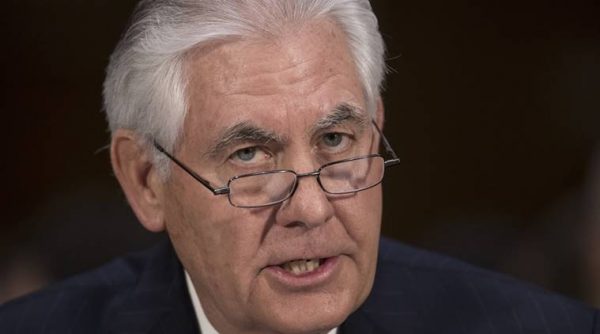
U.S. Secretary of State Rex Tillerson warned Thursday that China and Russia were assuming “alarming” roles in Latin America, and he urged regional powers to work with the United States instead.
“Latin America doesn’t need new imperial powers that seek only to benefit their own people,” Tillerson said in a speech at his alma mater, the University of Texas in Austin, before embarking on his first multination trip to South America.
“China, as it does in emerging markets throughout the world, offers the appearance of an attractive path to development, but in reality this often involves trading short-term gains for long-term dependency,” Tillerson said. He also derided Russia for selling weaponry to unfriendly, authoritarian governments in the region.
In his remarks, Tillerson laid out in broad terms the Trump administration’s policies toward Latin America and elsewhere in the Western Hemisphere.
After the speech, Tillerson left for Mexico City to meet with Mexican President Enrique Pena Nieto and other senior officials.
NAFTA talks
The United States and Mexico have had tense relations over President Donald Trump’s proposals to curb illegal immigration and have Mexico pay for a reinforced border wall. This week, the United States, Mexico and Canada also completed a sixth round of talks on renegotiating the North American Free Trade Agreement, which Trump often alleges has cost American jobs.
After visiting Buenos Aires and the Argentine mountain resort town of Bariloche, Tillerson is scheduled to head to Lima to meet with Peruvian President Pedro Pablo Kuczynski on issues including the eighth annual Summit of the Americas, set for April 13-14 in Lima.
In Colombia, Tillerson plans to meet with officials including President Juan Manuel Santos. They’re expected to discuss “the surge in coca cultivation and cocaine production, economic issues and the growing refugee population” from neighboring Venezuela, the State Department said in a statement.
During the South American part of the trip, Tillerson is expected to rally the region’s governments in pressing for democratic reforms in Venezuela.
The United States will use “all its political, diplomatic and economic tools to address the situation in Venezuela,” a senior State Department official said at a briefing this week on the trip.
Venezuela is in its fifth year of a worsening political and economic crisis.
Four more sanctioned
In January, the U.S. Treasury added four current or former Venezuelan senior military officials to its sanctions list, accusing them of corruption and repression that have contributed to critical shortages of food and medicine and the erosion of human rights. The European Union also has imposed sanctions, and the Organization of American States’ secretary-general, Luis Almagro, has championed democratic reforms for Venezuela.
On Thursday in Texas, Tillerson said the administration was not advocating for a “regime change” in Venezuela. He did, however, say it would be “easiest” if President Nicolas Maduro chose to leave power on his own.
Maduro, who accuses the United States of leading an international effort to topple his socialist administration, announced in January that he would seek a second six-year term and called for an election by April 30.
Tillerson will wrap up his trip with a stop in Jamaica on February 7.
Disrespect
China accused the United States of disrespecting Latin America after Tillerson warned countries in the region against excessive reliance on economic ties with China.
In a statement released late on Friday responding to Tillerson, China’s Foreign Ministry said cooperation between China and Latin America is based on common interests and mutual needs.
“What the United States said is entirely against the truth and displayed disrespect to the vast number of Latin American countries,” the ministry said.
Cooperation between China and Latin American countries is based on equality, reciprocity, openness and inclusiveness, it added.
“China is a major international buyer of Latin American bulk commodities, and imports more and more agricultural and high value-added products from the region,” the ministry said.
China’s investment in and financial cooperation with Latin American countries are in full accordance with commercial rules and local laws and regulations, it added.
“The development of China-Latin America ties does not target or reject any third party, nor does it affect the interests of third parties in Latin America,” the ministry said.
“We hope that relevant countries abandon outdated concepts of zero-sum games and look at the development of China-Latin America relations in an open and inclusive manner.”
Chinese Foreign Minister Wang Yi visited Chile last month for a summit with Latin American and Caribbean countries, where he invited them to join China’s massive Belt and Road infrastructure program.
Separately, the U.S. Treasury’s top economic diplomat, David Malpass, on Friday accused China of enabling poor governance in Venezuela by propping up the socialist government of President Nicolas Maduro through murky oil-for-loan investments.
New Delhi Times/REUTERS

Leave a Reply
You must be logged in to post a comment.